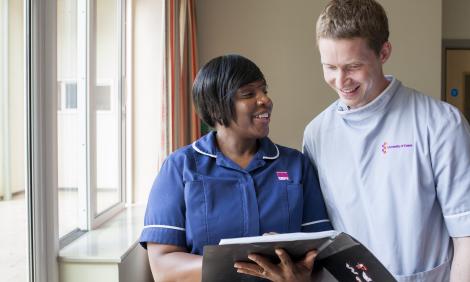Electives
Your course may include the opportunity to do placements of your choice, often called electives.
Find out from your university if electives are an option on the course you’re on or are considering.

You could gain experience related to:
- future career plans
- a healthcare specialism not offered by your course
- healthcare services in another country
You will usually need to organise and fund your own elective.
If you’re a medical student, take a look at our page about electives at medical school.
Why should you do an elective?
An elective can provide an insight into a specialist area not offered by your course, such as intensive care, accident and emergency, plastic surgery and burns, or working in a prison or military unit. Alternatively there may be a hospital or specialist unit that you’d like to work in.
An elective can help you gain extra experience/skills for your CV, for example:
- organising your own placement can demonstrate proactivity, planning or negotiation skills
- making sure you develop useful employability skills during the placement itself, for example problem solving, flexibility and resourcefulness. This is particularly so in less developed countries where you may have to use basic equipment or work within tighter budgets
You may be able to choose to work in a location where you would like to start your career, such as your home town. And experiencing healthcare in another country could help you see UK healthcare systems from a new perspective.
Choosing your elective
To help you choose which sort of elective will suit you best, ask yourself:
- do you want a new experience or an elective that will be specifically beneficial for your future career?
- what will the placement cost? Do you have or can you raise the money? Bear in mind there are very few sources of funding for healthcare electives. Remember you may need to continue paying for your existing student accommodation while you are away as well as accommodation on your elective
- do you have family commitments which mean you need to stay closer to home?
Planning your elective
- friends, family or contacts can be a good way into an elective. You may also be able to stay with them during your placement
- you’ll have to set yourself learning objectives and identify a suitably qualified mentor
- you’ll need to plan several months in advance, especially for placements outside of your current trust or abroad, as there may be time consuming paperwork and safety checks to be completed. In addition you may need to apply for visas or arrange vaccinations. For overseas electives you should start planning in September for a placement the following May
- if you want to work in a prison, Home Office clearance can take up to a year
- if you plan to go abroad, use the Commonwealth and Foreign Office website for the most up-to-date travel advice. Certain countries will not be advisable to visit and may not be covered by insurance
- consult the Consulate website of the country you wish to visit to check visa requirements. Check carefully, you may need a work visa even if you are a volunteer
- you may need to arrange insurance. Some companies offer insurance specifically for students volunteering abroad
- if you want to work outside the NHS you will need indemnity insurance. This is best organised through being a member of a professional association, such as the Royal College of Nursing
- check well ahead of time that your elective will be possible, to allow time to find an alternative if necessary. Universities have responsibility for you while you are on their courses so if a placement is not considered safe or adequately risk assessed, or doesn’t have a suitable mentor, you may not be able to go
Real-life story
Read Katie Skinn's real-life story. Katie travelled to Cape Town to see first-hand the midwifery services available there.
-
- don’t pay any money to an organisation until your university has confirmed you can do the placement
- if you are going abroad, familiarise yourself with local cultural and religious differences, safety issues and variations in healthcare practice. These will all be easier to cope with when you arrive if you have done some research beforehand
"Think big. If there is a particular hospital or specialist unit you’d really like to work in – there’s no harm in asking. Think carefully about what you’re asking for and why you are interested in this specialist area." Julie Apps, nursing lecturer, Manchester University
-
There are a few specialist organisations that offer short placements abroad that are suitable for a healthcare course elective. What they offer is often more tailored to an elective than the experiences offered by general volunteering or gap year companies.
Using a specialist organisation can be expensive but the price may include:
- a tried and tested vetted placement
- accommodation
- meals
- insurance
- airport transfers
- in-country support
The quoted price will not usually include the cost of return flights, visas and vaccinations.
However, you should check carefully, as your university may require you to do a placement assessed by a suitable mentor. Some organisations offer work shadowing only and not an assessed placement. Ask your university for recommendations of organisations used by previous students.
Organisations that provide healthcare placements include:
-
Bursaries or scholarships are sometimes available to cover some of the costs, but these can be very competitive. You could try:
- the Cavell Nurses’ Trust which provides awards for nursing and midwifery students
- professional bodies, such as the Royal College of Midwives (RCM), Royal College of Nursing (RCN) and the Chartered Society of Physiotherapists (CSP)
- charitable organisations, such as the Iolanthe Midwifery Trust
- Money 4 MedStudents - a website that provides a list of organisations that provide grants for dental, nursing and midwifery students




